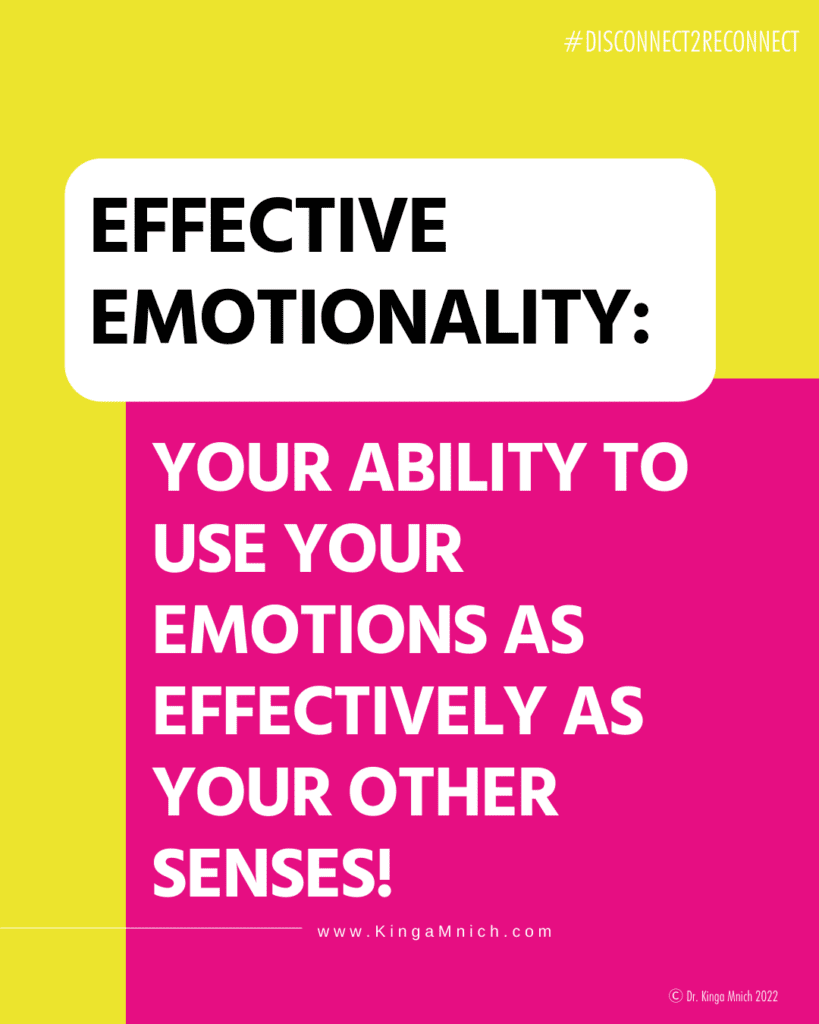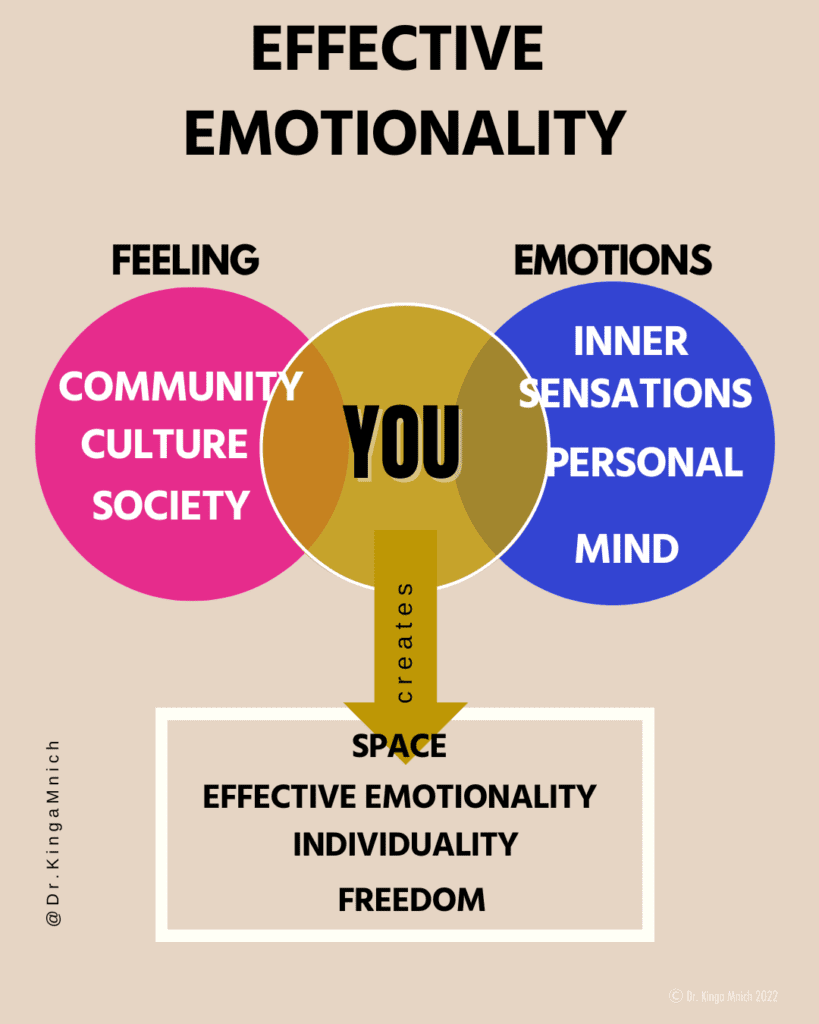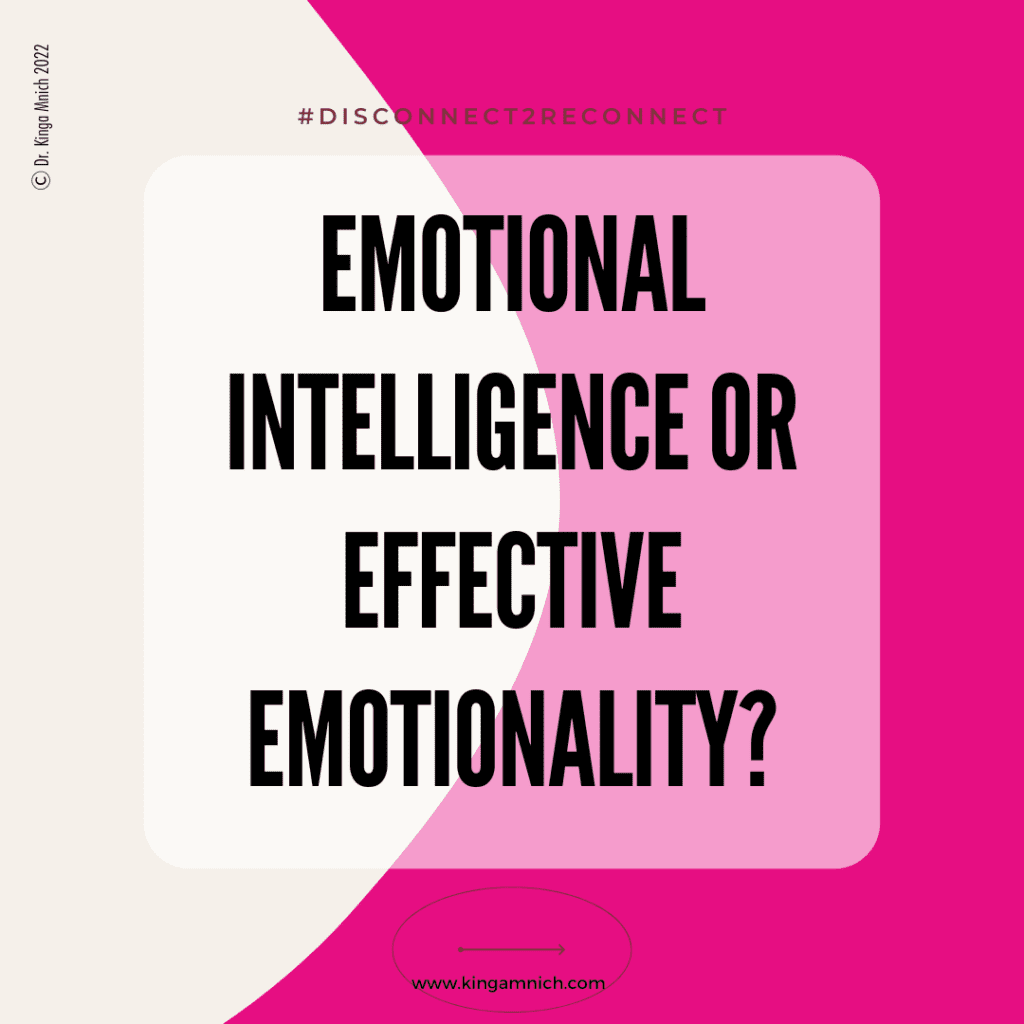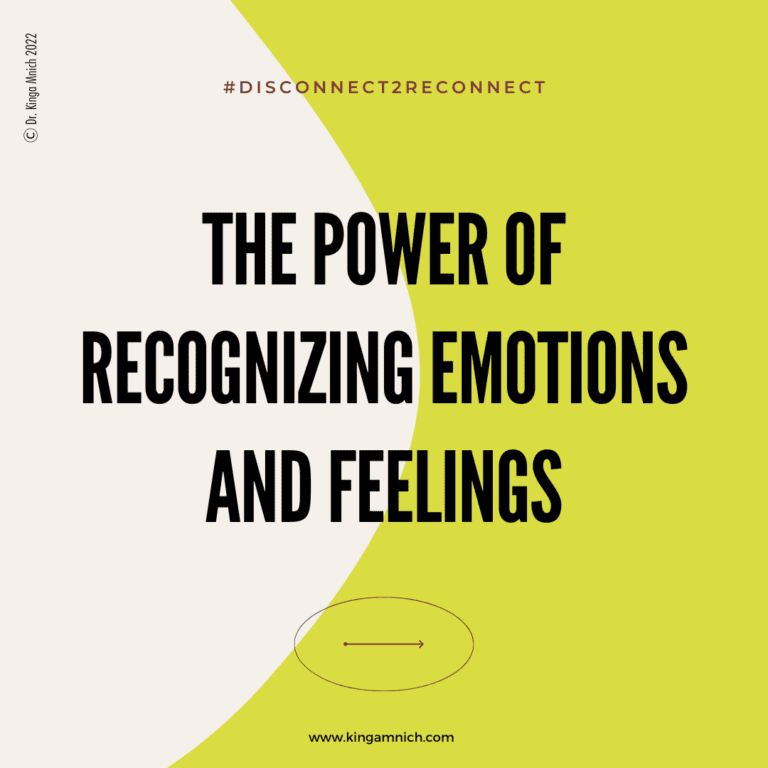What if I told you that you could toss the expression emotional intelligence into the bucket? And instead, use what I term as ‘effective emotionality’?
Why? Simply because the definition of emotional intelligence has become outdated as we have now learned so much more about emotions. The term, emotional intelligence, was coined in 1964 to describe a capacity to be aware of, control, and express one’s emotions and to handle interpersonal relationships judiciously and empathetically. It was outlined by two psychology professors, John D. Mayer of UNH and Peter Salovey of Yale in a research paper published in the Harvard Business Review.
Like many catchy terms, this expression made its way into leadership and organizational development practices. And, it gained traction and fame as the new it-tool in management development, soon becoming a technique that promised to make organizations more effective and, therefore, more lucrative.
Table of contents
- Did Emotional Intelligence become famous because of the promise to bring more profit?
- Why the definition of Emotional Intelligence needs to be updated?
- Let’s go first into the difference between emotions and feelings.
- So was Emotional Intelligence even possible?
- So what is Effective Emotionality?
- Is every moment in our lives relevant?
- Emotions as a sense not a reflection of who you are!
- And here’s where Effective Emotionality comes in!
- Imagine a world without the indoctrination of shame and embarrassment!
Did Emotional Intelligence become famous because of the promise to bring more profit?
Of course, that had to happen, particularly in areas where men are at work. Don’t get me wrong, die ‘Herren der Schöpfung’ do often have remarkable ideas and with better access to research opportunities, are able to secure arenas in which to explore those ideas. Unfortunately, men have also been socialized to think in a capitalistic way. Maybe that’s why their research often goes along the lines of how we can create a more efficient society. Instead of asking important basic questions such as how do we actually function? How can we create space for people’s individuality? Or maybe even dare to ask: How can an organization profit from people thriving through acceptance & individuality?
However, while Emotional Intelligence is still playing a role in some spheres, researchers such as Feldman & David, have also discovered that [a] there is no such thing as a universal understanding of emotions (which makes it really difficult to perceive other people’s emotions) and [b] there is a significant cultural component to emotions…more about that later on!
Why the definition of Emotional Intelligence needs to be updated?
Mayer defined it in HBR this way:
From a scientific (rather than a popular) standpoint, emotional intelligence is the ability to accurately perceive your own and others’ emotions; to understand the signals that emotions send about relationships; and to manage your own and others’ emotions. It doesn’t necessarily include the qualities (like optimism, initiative, and self-confidence) that some popular
definitions ascribe to it. (Source: How Emotional Intelligence Became a Key Leadership Skill)
Let’s start with ‘perceive other people’s emotions accurately’. Before Lisa Barett Feldman’s research was out, this was one of my favorite questions: is it actually possible to perceive other people’s emotions accurately? When people tell me that they know what I am feeling – or even more disturbing – they ‘feel’ what I am feeling, I immediately become alarmed.
I sincerely doubt that someone else has had the same life experiences as me and therefore learned to understand my inner sensations in the same way I am feeling them. Furthermore, Feldman showed that we even store our emotions in different areas of our brains. And, on top of all that comes the complex construct of ‘Feelings’, which are not even emotions!!
So, here we are at the perfect convoluted cocktail of misunderstood information that has been summed up into ‘emotional intelligence’.
According to EI we are capable of processing all these different cultural and individual aspects and becoming ‘emotionally intelligent’. I doubt that: which is most likely why EI was a famous concept, but in practice, it all-too-often fails.
So, if EI doesn’t work, why would then Effective Emotionality work?
Let’s go first into the difference between emotions and feelings.
Emotions are chemical reactions that move through our bodies as energy. They are not good or bad, neither are they positive nor negative. Feelings, on the other hand, are founded on our cultural and social upbringing, as well as our individual experiences and memories.
Emotions are like our other senses. They enable us to understand how we are aligned with what is happening around us.
However, feelings are more like languages. They are based on our social, and cultural upbringing, as well as, our personal experiences and memories. We give meaning to our emotions by creating feelings. In other words, our feelings give meaning to our emotions!
So was Emotional Intelligence even possible?
The concept behind ‘emotional Intelligence’ implied that we are intelligent enough and motivated enough to learn all of these differences. And further, use them on every single person around us. That might be true if one lived and worked in a completely homogeneous surrounding. It could also explain why so many organizations are still holding on to rigid hiring practices. The more homogenous the staff is, the less EI the manager feels they need to use.
While that concept may have been acceptable in the past, it really is time to retire it now.
So what is Effective Emotionality?

Effective Emotionality is a much more sensible and dynamic concept. Just as with Emotional Intelligence, it starts with understanding your own emotions…but then it also asks you to understand your feelings as well and to recognize the difference between inner sensations and outer impulses. Effective Emotionality focuses much more on the choices we have. It acknowledges the fact that we are indeed creating our own emotions and especially our own feelings.
Effective Emotionality is not about controlling your sensations, but more so about understanding how your emotions are your inner compass. And, how, within that compass, you have the choice as to how you want to feel.
Let’s go back to what emotions are: Energy in motion or, differently put, a chemical reaction going through your body. That usually lasts for just about 90 sec. So how come when you feel embarrassed, it can last the entire day at times?
Simple: because you are activating your critical thinking and you are moving from a physical reaction to a mental process. You are shifting your energy in a specific direction and creating a long-lasting sensation by thinking continuously about how you feel. This means that you are reacting all over again to what happened and then trapping yourself in a spiral of past experiences.
Is every moment in our lives relevant?

Very often we give too much meaning to a single event or a single moment. As human beings, we carry the immense fear of not meaning anything to anyone else and that’s why we often blow up the things that are happening around us. We are disturbing the emotional energy in our bodies.
When that happens the thing that you need to do is to ask yourself: Am I in the moment? Is this really what is happening right now?
We all realize that as just one human being in this enormous world, individually we don’t really matter much in the grand scheme of things. But our personal emotions and feelings are highly important in the matter of helping us figure out a direction for our own lives. Understanding our discrete connectivities with others around us matters far more than trying to imagine some sort of personal importance in the overall global community. This is what ‘Effective Emotionality’ is about: the ability to experience your inner sensation as a direction & connection tool in life.
Emotions as a sense not a reflection of who you are!
Emotions are like our other senses: they give us an understanding of the world around us by connecting us to it. They give meaning to experience: our feelings, in turn, give meaning to our emotions by attaching words to those emotions.
These words are prescribed by our culture and society, as well as by language. Feelings are these words. Emotions are just the inner sensations we are feeling, and it is essential to understand that they are neither positive nor negative.
The dualism behind many of our emotions comes from the narrow-mindedness of many modern cultures, which restricts our freedom to influence how we let our feelings modify those emotions.
And here’s where Effective Emotionality comes in!
It mostly starts with your belief system, which if we are being honest, isn’t actually yours to start with, as you are continually being socialized into a specific culture and society. This prescribes how you are supposed to feel and how you are expected to act.
For example, one culture might think wearing a Hijab (Headscarf) is a sign of modesty. Another culture will perceive it as a suppression of women. Another culture will believe that abortion is killing a human, while in others, it is a right to choose. These are of course, two extreme examples, but I hope they made you feel something for the purpose of going through these exercises.
The environment around you is tuning your inner compass. This doesn’t mean that these are your real opinions or beliefs. So, this is where the hard part begins; admitting to yourself that you might just have been supporting something that, in fact, you disagree with.
This means that you have to give up parts of who you previously believed you are. And letting go of pieces of yourself can feel like losing something. And, another layer – we may have also been tuned to believe that losing anything is painful and must be avoided by all means.
Let me remind you: Emotions are not good or bad. Neither are they positive or negative. They are simply energy moving through your body. Chemical reactions that you can interpret as you would like to interpret them.
Imagine a world without the indoctrination of shame and embarrassment!
Now, picture a world where you don’t feel ashamed anymore just because someone wants you to feel shame. A world in which you understand fully who you are without reaction to previously conditioned thoughts. A world where you don’t feel like you have to scream because you are experiencing anger? Or for that matter, feel like you have to suppress anything because you understand that anger is an indicator of your boundaries.
To my mind, this is freedom.
A world in which you realize that you are free to decide that sadness is neither a weakness nor a sign of loss but is instead an indicator of change and transition. It is a way to cleanse yourself and your thoughts and to free up more time for yourself.
Joy becomes a connection to your state of flow and is no longer a sensation that needs hours of long work and constant chasing to find.
Effective emotionality is that freedom. It is your ability to choose how you want to feel and what beliefs align with you. That enables you to give YOUR meaning to YOUR emotions.
It is an easy choice, I believe: effective emotionality and freedom are the way forward to a much better life.
Curious to learn more about emotions:
On Air with Ella – podcast episode 266: Managing Your Emotions for Aligned Decision Making – Dr. Kinga Mnich












5 Comments
I love this mind and emotional shift to Effective Emotionality. For years, I was reactive as with little knowledge of Mindfulness. With this shift, I can now choose to select my emotions!
And here I am still using the term “Emotional Intelligence” ( I remember taking an evaluation test for it in my late teen years) so thank you for explaining the need for updating it, the backstory of its inception and the importance of not interpreting emotions as good or bad. I look forward to learning more about “Effective Emotionality” and why we shouldn’t define ourselves over singular events – which is as humans what we tend to do.
Excellent points from a wise teacher. Thought-provoking and much needed. Thank you for this piece.
Effective emotionality is very interesting and makes complete sense. It brings hope to the processing of the challenges we are facing daily in our individual lives, but also globally as human beings.
Excellent analysis of what has become a trendy expectation without truly understanding it’s meaning or relevance in todays world.